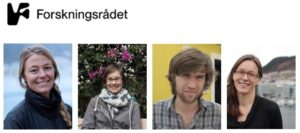Etter meget god uttelling i vårens tildelinger fra Forskningsrådet, er det meget gledelig å se at høsten starter i samme spor med hele fire nye prosjekter i siste tildelingsrunde, tre av disse er koordinert fra BIO. Vi gratulerer de ferske prosjektlederne/-partnerne og deres fagmiljøer!
PROGRAM: Samarbeidsprosjekt for å møte utfordringer i samfunn og næringsliv (KSP)
Aud Helen Halbritter Rechsteiner (koordinator): NatuRA – Sustainable use of Natural Resources in Alpine and mountain grassland ecosystems under global change (UTLYSNING: Arealer under press)
Anna Jeja Gabriella Ljungström (koordinator): Unlocking the Nutritional and Environmental Potential of Small Pelagic Fish: A Path Towards Sustainable Food Systems (UTLYSNING: Temaer på tvers)
Vigids Vandvik (partner): Actionable budgets for sustainable climate and nature governance
PROGRAM: Forskerprosjekt for fornyelse
Anders Martin Frugård Opdal: Regional downscaling of biological predictions. From global crisis to local coping (UTLYSNING:Klima og miljø)
Les mer om prosjektene
 Halbritter, NatuRA: The project «NatuRA – Sustainable use of Natural Resources in Alpine and mountain grassland ecosystems under global change» is a Collaborative and Knowledge-building Project for the call “Area under pressure”. The overarching objective of the NatuRA project is to generate new knowledge on how mountain grassland ecosystems and their natural resources have been traditionally and are currently managed, how they are now affected by global changes and changes in management practices, and then use this knowledge to co-develop nature-based solutions with local stakeholders to sustainably safeguard these social-ecological systems and livelihoods under global change. The project involves field experiments, modelling, syntheses, and close co-production with local expert practitioners and indigenous governance systems to ensure inclusion and maximise societal impact.
Halbritter, NatuRA: The project «NatuRA – Sustainable use of Natural Resources in Alpine and mountain grassland ecosystems under global change» is a Collaborative and Knowledge-building Project for the call “Area under pressure”. The overarching objective of the NatuRA project is to generate new knowledge on how mountain grassland ecosystems and their natural resources have been traditionally and are currently managed, how they are now affected by global changes and changes in management practices, and then use this knowledge to co-develop nature-based solutions with local stakeholders to sustainably safeguard these social-ecological systems and livelihoods under global change. The project involves field experiments, modelling, syntheses, and close co-production with local expert practitioners and indigenous governance systems to ensure inclusion and maximise societal impact.
This is a collaborative project between Norway and South Africa and builds on long-term collaboration with Peter Le Roux (University of Pretoria) and V. Ralph Clark (Afromontane Research Unit at the University of the Free State) in South Africa through the Plant Functional Trait Courses and the Biodiversa project RangeX. The project is led by Aud Halbritter and the partners involved at Bio (UiB) are Vigdis Vandvik, Alicia Barraclough and Inger Måren.
Ljungström, Unlocking the Nutritional and Environmental Potential of Small Pelagic Fish: To tackle the growing environmental and human health concerns related to our current food production and consumption patterns we are advised to transition to predominantly plant-based diets. While eating more plants is associated with better health, animal-source foods contain several important micronutrients that are not available from plants. Norway owns a plentiful resource, small pelagic fish, that is rich in these nutrients, affordable, and has a low carbon footprint.
The overarching objective of the project is to provide tangible solutions for how Norway can utilize its small pelagic fish catch to benefit public health and the environment. We will explore this via three main goals:
- Use a food systems perspective to assess how different utilization strategies for small pelagics affect nutritional output and carbon footprint.
- Provide information to guide dietary advice and product innovation for the use of small pelagic fish to help prevent nutritional deficiencies associated with plant-based diets.
- Outline guidelines for a “blue boost” label that helps environmentally conscious consumers to make healthy and nutritionally adequate choices.
Vandvik, Actionable budgets for sustainable climate and nature governance: This project helps municipalities and regional authorities make more sustainable decisions, by integrating budgets for emissions reductions and land use change into financial and other forms of administrative and political decision-making. The project unites partners at the forefront in piloting climate budgeting and nature accounting – City of Bergen and Vestland County Council – expertise from human geography, biology, political science and law at University of Bergen, NIBIO and NINA, and sustainable futures literacy agents Fremtenkt. ECOBUDGETS uses state-of-the-art methodologies for contributions to scientific literature on accountability and metrics in sustainable governance and real-world impact on climate and nature sustainability.
In this SV-fak led project BIO is partner as it builds on the ongoing NFR KSP project ECOMAP, coordinated by Vigdis Vandvik.
Opdal, Regional downscaling of biological predictions: I en tid med historisk og fremtidig oppvarming av kloden trenger vi modeller som kan predikere de fremtidige økologiske konsekvensene. For marine system består disse modellene ofte av en global klimamodell knyttet til ulike temperaturdrevne funksjoner som representerer biologiske og fysiologiske effekter. De fleste slike funksjoner er svært generelle og ofte basert på gjennomsnittsverdier på tvers av arter og system. Det er derfor sannsynlig at prediksjonene blir feil for en enkelt art eller region. Dessverre vet vi lite om hvor vanlige slike feil er, ettersom modellene nesten utelukkende brukes til å predikere fremtiden, og så godt som aldri fortiden.
I denne søknaden plukker vi ut sentrale modell-forventninger og skalerer dem ned til det regionale miljøet for ulike fiskebestander i norske farvann. Forventningene testes og analyseres ved hjelp av eksepsjonelt lange tidsserier, fysiologiske eksperiment og mekanistiske modeller for bioenergetikk og livshistorie.
Foreløpige resultater peker mot at flere fiskearter er mer fleksible, både fysiologisk og adferdsmessig, enn generelle modeller klarer å fange opp. Disse og fremtidige prosjektresultater vil bidra til å lage bedre prediksjoner, og forhåpentligvis også utvide forståelsen vår om hvordan temperatur virker og ikke virker på ulike biologiske prosesser.

